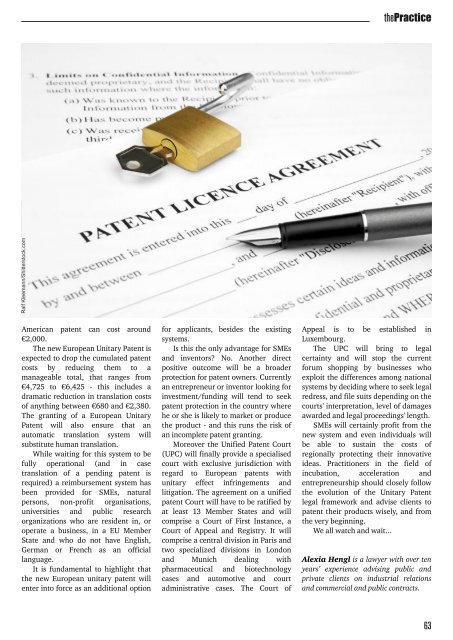TBIXI3
TBIXI3
TBIXI3
Create successful ePaper yourself
Turn your PDF publications into a flip-book with our unique Google optimized e-Paper software.
Ralf Kleemann/Shitterstock.com<br />
American patent can cost around<br />
€2,000.<br />
The new European Unitary Patent is<br />
expected to drop the cumulated patent<br />
costs by reducing them to a<br />
manageable total, that ranges from<br />
€4,725 to €6,425 - this includes a<br />
dramatic reduction in translation costs<br />
of anything between €680 and €2,380.<br />
The granting of a European Unitary<br />
Patent will also ensure that an<br />
automatic translation system will<br />
substitute human translation.<br />
While waiting for this system to be<br />
fully operational (and in case<br />
translation of a pending patent is<br />
required) a reimbursement system has<br />
been provided for SMEs, natural<br />
persons, non-profit organisations,<br />
universities and public research<br />
organizations who are resident in, or<br />
operate a business, in a EU Member<br />
State and who do not have English,<br />
German or French as an official<br />
language.<br />
It is fundamental to highlight that<br />
the new European unitary patent will<br />
enter into force as an additional option<br />
for applicants, besides the existing<br />
systems.<br />
Is this the only advantage for SMEs<br />
and inventors? No. Another direct<br />
positive outcome will be a broader<br />
protection for patent owners. Currently<br />
an entrepreneur or inventor looking for<br />
investment/funding will tend to seek<br />
patent protection in the country where<br />
he or she is likely to market or produce<br />
the product - and this runs the risk of<br />
an incomplete patent granting.<br />
Moreover the Unified Patent Court<br />
(UPC) will finally provide a specialised<br />
court with exclusive jurisdiction with<br />
regard to European patents with<br />
unitary effect infringements and<br />
litigation. The agreement on a unified<br />
patent Court will have to be ratified by<br />
at least 13 Member States and will<br />
comprise a Court of First Instance, a<br />
Court of Appeal and Registry. It will<br />
comprise a central division in Paris and<br />
two specialized divisions in London<br />
and Munich dealing with<br />
pharmaceutical and biotechnology<br />
cases and automotive and court<br />
administrative cases. The Court of<br />
thePractice<br />
Appeal is to be established in<br />
Luxembourg.<br />
The UPC will bring to legal<br />
certainty and will stop the current<br />
forum shopping by businesses who<br />
exploit the differences among national<br />
systems by deciding where to seek legal<br />
redress, and file suits depending on the<br />
courts' interpretation, level of damages<br />
awarded and legal proceedings' length.<br />
SMEs will certainly profit from the<br />
new system and even individuals will<br />
be able to sustain the costs of<br />
regionally protecting their innovative<br />
ideas. Practitioners in the field of<br />
incubation, acceleration and<br />
entrepreneurship should closely follow<br />
the evolution of the Unitary Patent<br />
legal framework and advise clients to<br />
patent their products wisely, and from<br />
the very beginning.<br />
We all watch and wait...<br />
Alexia Hengl is a lawyer with over ten<br />
years’ experience advising public and<br />
private clients on industrial relations<br />
and commercial and public contracts.<br />
63


